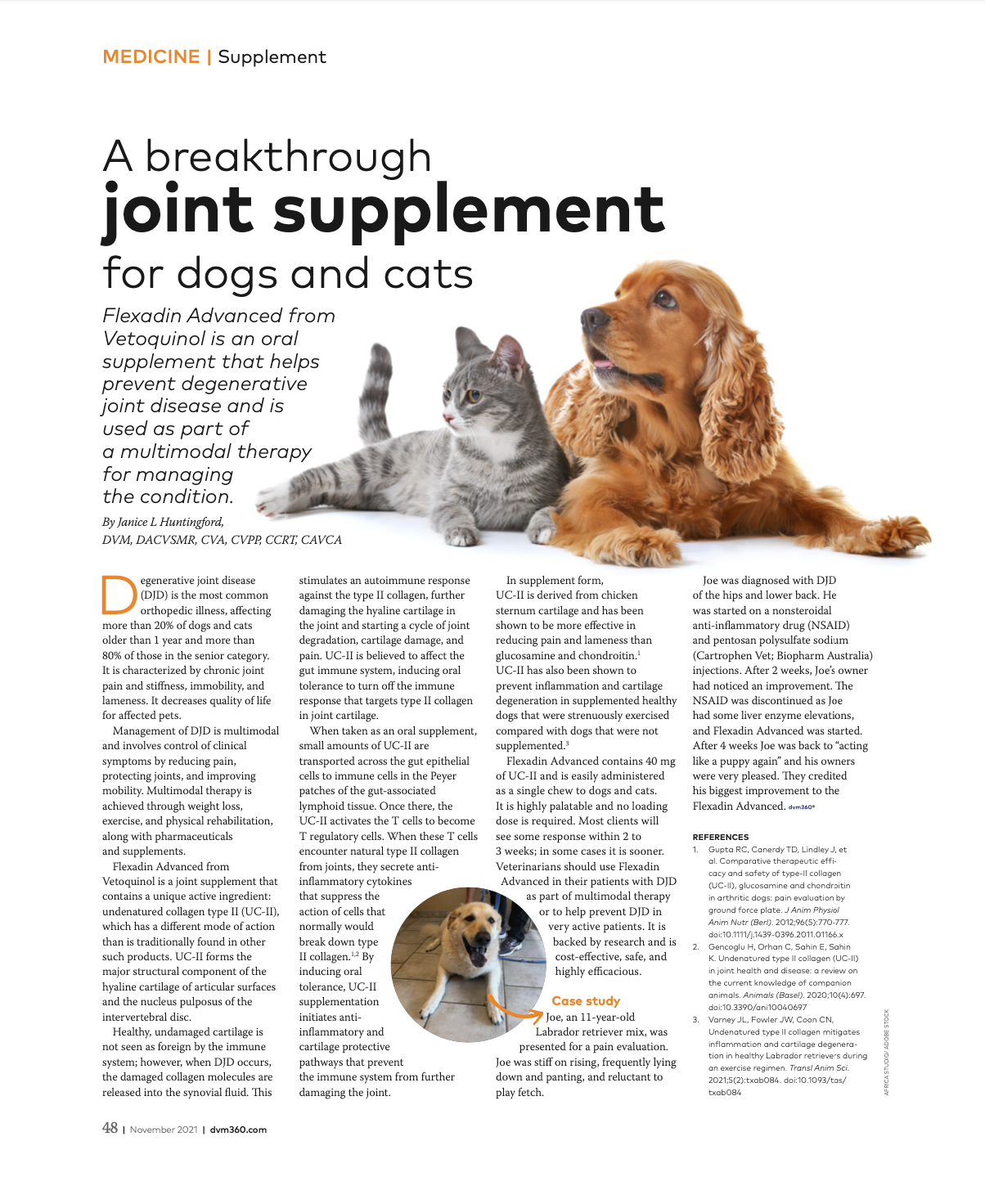
- dvm360 November 2021
- Volume 52
A breakthrough joint supplement for dogs and cats
Flexadin Advanced from Vetoquinol is an oral supplement that helps prevent degenerative joint disease and is used as part of a multimodal therapy for managing the condition.
Degenerative joint disease (DJD) is the most common orthopedic illness, affecting more than 20% of dogs and cats older than 1 year and more than 80% of those in the senior category. It is characterized by chronic joint pain and stiffness, immobility, and lameness. It decreases quality of life for affected pets.
Management of DJD is multimodal and involves control of clinical symptoms by reducing pain, protecting joints, and improving mobility. Multimodal therapy is achieved through weight loss, exercise, and physical rehabilitation, along with pharmaceuticals and supplements.
Flexadin Advanced from Vetoquinol is a joint supplement that contains a unique active ingredient: undenatured collagen type II (UC-II), which has a different mode of action than is traditionally found in other such products. UC-II forms the major structural component of the hyaline cartilage of articular surfaces and the nucleus pulposus of the intervertebral disc.
Healthy, undamaged cartilage is not seen as foreign by the immune system; however, when DJD occurs, the damaged collagen molecules are released into the synovial fluid. This stimulates an autoimmune response against the type II collagen, further damaging the hyaline cartilage in the joint and starting a cycle of joint degradation, cartilage damage, and pain. UC-II is believed to affect the gut immune system, inducing oral tolerance to turn off the immune response that targets type II collagen in joint cartilage.
When taken as an oral supplement, small amounts of UC-II are transported across the gut epithelial cells to immune cells in the Peyer patches of the gut-associated lymphoid tissue. Once there, the UC-II activates the T cells to become T regulatory cells. When these T cells encounter natural type II collagen from joints, they secrete anti-inflammatory cytokines that suppress the action of cells that normally would break down type II collagen.1,2 By inducing oral tolerance, UC-II supplementation initiates anti-inflammatory and cartilage protective pathways that prevent the immune system from further damaging the joint.
In supplement form, UC-II is derived from chicken sternum cartilage and has been shown to be more effective in reducing pain and lameness than glucosamine and chondroitin.1 UC-II has also been shown to prevent inflammation and cartilage degeneration in supplemented healthy dogs that were strenuously exercised compared with dogs that were not supplemented.3
Flexadin Advanced contains 40 mg of UC-II and is easily administered as a single chew to dogs and cats. It is highly palatable and no loading dose is required. Most clients will see some response within 2 to 3 weeks; in some cases, it is sooner. Veterinarians should use Flexadin Advanced in their patients with DJD as part of multimodal therapy or to help prevent DJD in very active patients. It is backed by research and is cost-effective, safe, and highly efficacious.
Case study
Joe, an 11-year-old Labrador retriever mix, was presented for a pain evaluation. Joe was stiff on rising, frequently lying down and panting, and reluctant to play fetch.
Joe was diagnosed with DJD of the hips and lower back. He was started on a nonsteroidal anti-inflammatory drug (NSAID) and pentosan polysulfate sodium (Cartrophen Vet; Biopharm Australia) injections. After 2 weeks, Joe’s owner had noticed an improvement. The NSAID was discontinued as Joe had some liver enzyme elevations, and Flexadin Advanced was started. After 4 weeks Joe was back to “acting like a puppy again” and his owners were very pleased. They credited his biggest improvement to the Flexadin Advanced.
References
- Gupta RC, Canerdy TD, Lindley J, et al. Comparative therapeutic effi- cacy and safety of type-II collagen (UC-II), glucosamine and chondroitin in arthritic dogs: pain evaluation by ground force plate. J Anim Physiol Anim Nutr (Berl). 2012;96(5):770-777. doi:10.1111/j.1439-0396.2011.01166.x
- Gencoglu H, Orhan C, Sahin E, Sahin K. Undenatured type II collagen (UC-II) in joint health and disease: a review on the current knowledge of companion animals. Animals (Basel).2020;10(4):697. doi:10.3390/ani10040697
- Varney JL, Fowler JW, Coon CN, Undenatured type II collagen mitigates inflammation and cartilage degeneration in healthy Labrador retrievers during an exercise regimen. Transl Anim Sci. 2021;5(2):txab084. doi:10.1093/tas/ txab084
Articles in this issue
about 4 years ago
National Pet Diabetes Month: Raising awareness and making stridesabout 4 years ago
Dental Pain and Inflammation—Acute and Chronicabout 4 years ago
Veterinary technicians embrace their rolesabout 4 years ago
Understanding and diagnosing canine hypothyroidismabout 4 years ago
Embark Veterinary releases first-ever purebred dog DNA kitabout 4 years ago
Zoetis adds digital cytology testing to Vetscan Imagystabout 4 years ago
dvm360® welcomes 11 new SAP partners globallyNewsletter
From exam room tips to practice management insights, get trusted veterinary news delivered straight to your inbox—subscribe to dvm360.





